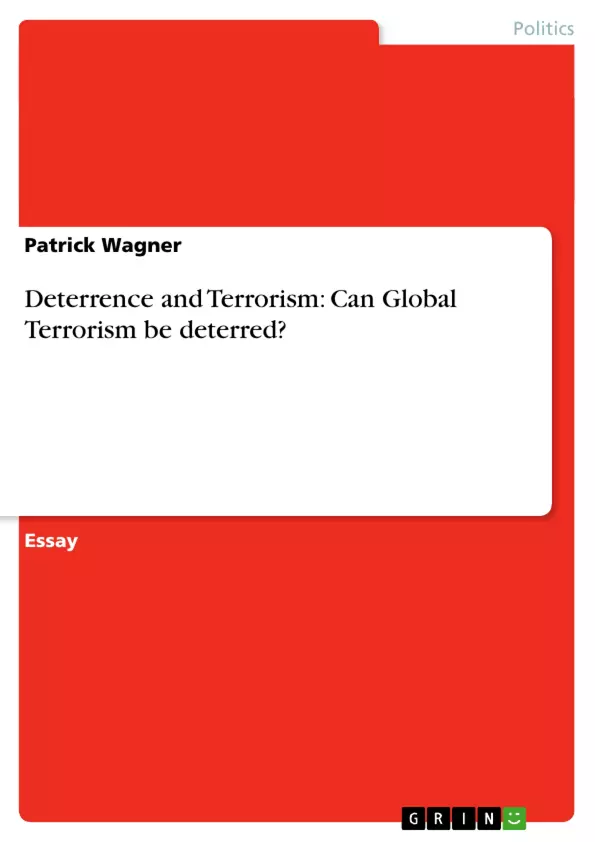For more than four decades during the Cold War, deterrence has been a key element of US defence policy and it can even be argued that the strategy of nuclear deterrence thwarted a major military confrontation between the Soviet Union and the USA. With the end of superpower tensions and the end of the Cold War itself, the deterrence system became obsolete. However, the terrorist attacks of September 11 brought deterrence back on the political agenda. In its National Strategy to Combat Weapons of Mass Destruction the USA calls for “new methods of deterrence” in order to meet the threats of global terrorism.
The question arises whether deterrence, which seems to have worked in a traditional setting, where one state deters military action of another state, can work in a non-traditional confrontation between a state and an abstract opponent like terrorism? In order to establish whether deterrence can work against terrorism, this essay will firstly look at the theory of deterrence. What are the criteria that must be fulfilled for deterrence to be successful and why does it not work in all situations?
Secondly, this essay identifies the main characteristics of the terrorist threat and establishes what the difficulties of deterrence in this specific asymmetric confrontation might be. The main difficulty seems to be the problem to execute appropriate action should deterrence fail, since the target is often unclear and the perpetrator of the terrorist action most likely dead. Special attention is given to the moral dilemma that derives from suggestions to execute retaliation actions against the families of suicide bombers in order to deter others from becoming suicide bombers as suggested by Steinberg. He argues that terrorism can indeed be deterred, if the concept was applied correctly, that is against terrorist leaders, who are “not so quick to give up their own lives” .
Finally, this essay will conclude that although it might be possible to deter individual terrorist actions , terrorism itself cannot be deterred by military means. And if the aim is indeed to eradicate terrorism completely, like the rhetoric used in the war on terrorism seems to suggest, deterrence is certainly not the most effective strategy.
Inhaltsverzeichnis (Table of Contents)
- Deterrence and Terrorism
- Can Global Terrorism be Deterred?
- Deterrence Theory
- The Characteristics of the Terrorist Threat
- The Moral Dilemma of Retaliation
Zielsetzung und Themenschwerpunkte (Objectives and Key Themes)
This essay examines whether the concept of deterrence, which has historically been effective in deterring military action between states, can be applied effectively against the threat of global terrorism. It analyzes the theoretical foundations of deterrence, explores the unique challenges posed by the asymmetric nature of the conflict between states and terrorist organizations, and delves into the moral complexities surrounding the use of retaliation against terrorism.
- The effectiveness of deterrence against terrorism
- The theoretical underpinnings of deterrence
- The unique challenges of deterring terrorism
- The moral implications of retaliatory actions
- The role of communication, capability, and credibility in deterrence
Zusammenfassung der Kapitel (Chapter Summaries)
- The essay first introduces the concept of deterrence, outlining its key principles and its historical application in the context of Cold War superpower relations. It highlights the importance of factors such as communication, capability, and credibility for successful deterrence.
- The second chapter delves into the specific characteristics of the terrorist threat, emphasizing the difficulties of applying traditional deterrence strategies in this context. The essay points out that terrorists often lack clear organizational structures and are motivated by factors that make them less susceptible to traditional deterrence tactics. The challenge of identifying and targeting terrorist leaders, especially in the absence of a centralized command structure, is also discussed.
- The third chapter explores the moral implications of retaliatory actions against states harboring terrorists. The essay acknowledges the potential for unintended consequences and the difficulty of ensuring the proportionality and legitimacy of such actions, especially when innocent civilians may be caught in the crossfire.
Schlüsselwörter (Keywords)
This essay focuses on key concepts such as deterrence theory, asymmetric warfare, terrorism, retaliation, communication, capability, credibility, and moral dilemmas in the context of international conflict management. It also examines the effectiveness of deterrence in deterring terrorist activities.
Frequently Asked Questions
Can global terrorism be effectively deterred?
The essay concludes that while individual actions might be deterred, terrorism itself cannot be fully eradicated through traditional military deterrence alone.
Why is deterring terrorism harder than deterring a state?
Terrorism is an asymmetric threat with abstract opponents who often lack clear targets for retaliation and are sometimes willing to die for their cause.
What are the key criteria for successful deterrence?
Deterrence requires three main elements: clear communication of threats, the actual capability to carry them out, and the credibility that the state will act.
What is the moral dilemma regarding retaliation?
The essay discusses the ethical issues of retaliating against families of suicide bombers or states harboring terrorists, where innocent civilians may be affected.
Can terrorist leaders be deterred?
Some argue that leaders who value their own lives can be deterred if the consequences are applied correctly against them specifically.
- Citation du texte
- Patrick Wagner (Auteur), 2004, Deterrence and Terrorism: Can Global Terrorism be deterred?, Munich, GRIN Verlag, https://www.grin.com/document/26031



